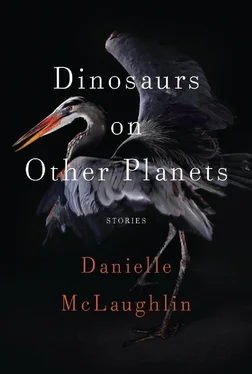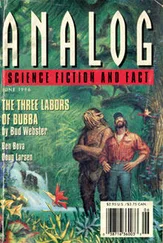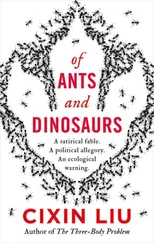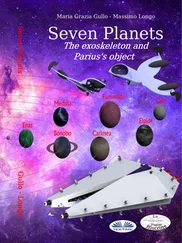Oisín and Pavel were at the table, playing with the contents of the Tayto box. The two-wheeled truck had been commandeered for a war effort involving the soldiers and a tower built from jigsaw pieces stacked one on top of the other. “I thought Oisín was staying with us,” Kate said.
Emer shook her head. “Nope,” she said. “He’s coming with me. He likes galleries.”
“I’ll drive you,” Pavel said quietly, getting up from the table.
“No, thank you. I can manage.”
“You’re not used to that car,” he said. “I don’t have to meet your friends, I can drop you off and collect you later.”
“I’d rather walk,” Emer said.
“Listen to her,” Colman said, to no one in particular, “the great walker.” He had a screwdriver and was taking apart a broken toaster, setting the pieces out on the floor beside his armchair. He put down the screwdriver, sighed, and stood up. “We’ll go in my car,” he said. He nodded to Oisín—“Come on, sonny”—and without saying more he left the kitchen. The boy immediately abandoned his game and trotted down the hall after his grandfather. Already he had adopted his walk, a comically exaggerated stride, his hands stuck deep in his pockets. Emer gave her mother a perfunctory kiss and followed them.
After they left, Pavel excused himself, saying he had work to do. “I’m afraid I’m poor company,” he said. He went upstairs, and Kate busied herself with everyday jobs, feeding the cat, folding laundry, though she didn’t vacuum in case it might disturb him. She wondered what he did for a living and imagined him first as an architect, then as an engineer of some sort. She put on her gardening gloves and took the waste outside for composting. The garden was a mess. Winter had left behind broken branches, pinecones, and other storm wreckage, the forest’s creeping advance. She remembered how years ago a man had come selling aerial photographs door-to-door. He had shown her a photo of their house and, next to it, the forest. And she had been astonished to see that, from the air, the forest was a perfect rectangle, as if it had been drawn with a set square, all sharp angles and clean lines.
Noon passed, and the day moved into early afternoon. She listened for the sound of Pavel moving about the room overhead, but everything was quiet. Eventually, she went upstairs to see if he would like some lunch. She knocked and heard the creak of bedsprings, then footsteps crossing the floor. When he opened the door, she saw papers spread across the bed, black-and-white streetscapes with sections hatched in blue ink, and thought, Yes, an architect after all. “You could have used the dining room table,” she said. “I didn’t think.”
“It’s fine,” he said. “I can work anywhere. I’m finished now anyway.”
She had intended to ask if she could bring him up a sandwich, but instead heard herself say, “I’m going for a walk, if you’d like to join me.”
“I’d love to,” he said.
She put on her own boots and found a pair for him in the shed. They didn’t take the shortcut through the field, but crossed the road at the end of the driveway and followed an old forestry path that skirted the scrub. Passing the pyre of timber that was once the hut, he said: “I saw your husband chopping firewood this morning. He’s a remarkably fit man for his age.”
“Yes,” she said, “he was always strong.”
“You must have been very young when you married.”
“I was twenty-three,” she said. “Hardly a child bride, but young by today’s reckoning, I suppose.”
They arrived at an opening into the forest. A sign forbidding guns and fires was nailed to a tree, half of the letters missing. He hesitated, and she walked on ahead, down a grassy path littered with pine needles. She slowed to allow him to catch up and they walked side by side, their boots sinking into the ground, soft from recent rain. Ducking now and again to avoid branches, they kept to the center path, looking left and right down long tunnels of trees. They stopped at a sack of household waste — nappies, eggshells, foil cartons — spilling over the forest floor.
“Who would do such a thing?” Pavel said.
“A local, most likely,” she said. “They come here at night when they know they won’t be seen.” Pavel tried to gather the rubbish back into the bag, a hopelessly ineffective gesture, like a surgeon attempting to heap intestines back into a ruptured abdomen. When he stood up, his hands were covered in dirt and pine needles. She took a handkerchief from her coat pocket and handed it to him.
“Does it happen a lot?” he said.
“Only close to the entrance,” she said. “People are lazy.” He had finished with the handkerchief and seemed unsure what to do with it. “I don’t want it back,” she said, and, grinning, he put it in his own pocket.
It was quieter the farther in they went, fewer birds, the occasional rustle of an unseen animal in the undergrowth. He talked about London and about his work, and she talked about moving from the city, the years when the children were young, John in Japan. She noticed his limp becoming more pronounced and slowed her pace.
“Thanks for going to such trouble with the room,” he said.
“It was no trouble.”
“I was touched by it,” he said. “Especially the bear duvet and the rabbit.”
She glanced at him, and saw that he was teasing. She laughed.
“She didn’t tell you I was coming, did she?” he said.
“No, but it doesn’t matter.”
“I’m sorry it caused awkwardness,” he said. “I know your husband is annoyed.”
“He’s annoyed with Emer,” she said, “not with you. Anyway, it doesn’t matter.”
She sensed he was tiring, and when they came to a fallen tree, she sat on the trunk and he sat beside her. She tilted her head back and looked up. Here there was no sky, but there was light, and as it traveled down through the trees, it seemed to absorb hues of yellow and green. She saw the undersides of leaves, illuminated from above, and their tapestries of green and white veins. A colony of toadstools, brown puffballs, sprouted from the grass by her feet. Pavel nudged them with his boot. They released a cloud of pungent spores and, fascinated, he bent and prodded them with his finger until they released more. He got out his phone and took a photograph.
“I’ve seen Oisín three times in the last four years,” she said. “Emer will take him back to London tomorrow, and I can’t bear it.”
He put the phone away and, reaching out, he took her hand. “I’m sorry,” he said. “I don’t understand why Emer would live anywhere else when she could live here. But then I guess I don’t understand Emer.”
“I’m a stranger to him,” she said. “I’m his grandmother, and I’m a stranger. He’ll grow up not knowing who I am.”
“He already knows who you are. He’ll remember.”
“He’ll remember that bloody skull in the bucket,” she said bitterly.
Very softly, he began to stroke her palm with his thumb. She pulled her hand away and got up, stood with her back to him. Still facing away, she pointed to a dark corridor of trees that ran perpendicular to the main path. “That’s a shortcut,” she said. “It leads back down to the road. I remember it from years ago when the children were small.”
This route was less used by walkers, tangled and overgrown, obstructed here and there by trees that leaned in a slant across the path, not quite fallen, resting against other trees. Ferns grew tall and curling, and the moss was inches thick on the tree trunks. In the quiet, she imagined she could hear the spines of leaves snapping as her boots pressed them into the mud. They walked with their hands by their sides, so close that if they hadn’t been careful, they might have touched. The path brought them to an exit by the main road, and they walked back to the house in silence, arriving just as Colman’s car pulled into the driveway.
Читать дальше












